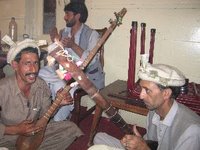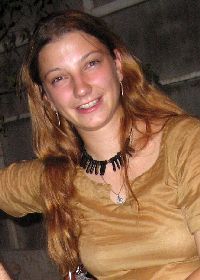Daily life in the Kalash Valleys
Sometimes some young Kalash complain about boredom in winter, but usually they know how to make themselves busy. A lot of work still has to be done. They bring wood everyday and usually cut it only when needed. New clothes are made, belts woven and headdresses designed. The new clothes should be ready for the spring festival – they are not in a hurry as yoshi takes place in May. Some go with the goats or bring holmoak branches for them. Mostly they go „jekher“ which means „visitig here and there“ and chat about the actual issues. Usually about weather, how much snow has fallen and if the Jeeps will be able to drive next morning. And certainly about the snow condition for the beloved snow hockey game. Now the snow is still to soft. Snow hockey is played by 2 teams with the same number of players who are positioned some hundred meters from each other up valley, waiting for the more or less round wooden ball to hit it hard in order to make it fly far. The snow must be strong enough to carry the ball otherwise it would sink in the snow, which would cost time. Some tricky players have a similar ball in their pocket to avoid seeking, but the opponents have an eye on them. The team whose ball reaches first at the last person is the winners. The losers have to feed them lavishly, music and dance will continue all night. Everyday they impatiently check the snow. A few more days…
So the talking goes on, another round of cheese is distributed and eaten with sweet milk tea. Making tea they don’t stir after putting sugar, they just pour tons of it, pouring one cup and pouring it back again in the teakettle. Teeth obviously suffer from this, but sugar is not seen as the cause.

Other daily food is rather rare. Bread, kidney beans and cheese is served almost every day several times. My belly is swollen like a gas balloon, I sound like a machine gun, but as everyone eats beans everyone smells same and no one cares.
For „Eid“ festival (an Islamic feast) meat is served at all times from breakfast till midnight snack – with all things like tendons, gristles, veins, bones and what ever was in the goat or cow.
In the evenings we play cards, sometimes till 2, 3 or 4 in the morning. Tikka, Dali and Taj are always there to play, some other appear from time to time. At Faizi‘s house they watch TV, the kids stare at the screen like hypnotized, the DVD quality is a disaster, but TV channels are not easily receivable in the midst of mountain ranges. Satellite is expensive, so what to do? I often tried to explain, that these violent Bollywood movies with raping, murder and beating are not the best education media for children, but the are no alternatives.
In Biriu, were I have arrived after the common delays everyday someone plays flute, drum, sitar – much more than in Bumburet, where it takes days to arrange a good program. In Biriu it just happens, no matter where u go – the valley of music.

Jamil or Baras Khan are always there to sing and play. In the evenings we also play cards here in a hotel with a lot of empty rooms and one with a Karambol board and cards. Multitalent Baras is one of the best players here – he is training every day. „At 9 o‘clock I can‘t sleep, so I come here almost every night.“
Also for me it‘s difficult to go to bed at 9 if there is coincidentally no music. The village is sleeping at 9pm on these days. There is no stove in my room so I go to sleep when the family goes – or better: I try, which ends in never-ending turns to left and right without result. I was used to long evenings in Bumburet so I was happy as Baras Khan told me about this hotel (After 2 days).
Rabijan awakes at 5 o‘clock to bake bread for breakfast at a time when sun has not even thought about rising. I have always loved the warm morning hours in the sleeping bag, slowly waking up, slowly getting dressed and slowly eating breakfast – then the day can start.
Rabijan always prepares walnut bread, she knows I love it. At my arrival she was standing at the „outskirts“ of the village to welcome me first, her face happy but with a certain reproach. „Where have u been so long? I heard you were in Bumburet, do you like it better there?“
Certainly not, if feel at home only here in Biriu in her house, but it just happened, time passed by… that’s life…
Women still attend Urdu classes like in summer. I join Rabijan sometimes to go there, it‘s still the same fun. In the evenings we bend over the Urdu books explaining each other letters and meaning. Urdu script is not that easy, letters change according to their position. Reading is quite ok – not perfect, but nobody is perfect – but writing new words is a miracle for me.
We will ask the teacher next afternoon. Slowly slowly the ladies come, some only after an hour, but the teacher welcomes them with joy. „Hey Baba, nice to see you. It‘s great that you found time. Come and join!“ In the end singing and dancing complete the lessons.
Rabijan is always in a funny mood, joking and laughing and leading the dances with natural authority. Her 2 kids have inherited this charm. With Masran I could play hours – what we daily do. Her son Arif Ali Shah prefers playing cards which also gives us some time.
Here in Biriu the sun twinkles early from behind the mountains. At 9:30am it fully shines. The women sit in the warm rays weaving belts, spinning wool, washing clothes or plaiting braids at the river.
I started making bracelets of wool like in my childhood.
Sometimes I try to work at night to, but the open fire in my room creates rather smoke than heat and my eyes hurt after a while.
Every night – already wrapped tightly in my sleeping bag - I have to decide if stay in bed risking death by smoke intoxication or for the sake of my life open the warm sleeping bag and the door to let fresh but ice cold air inside.
Kalash seem to be immune against smoke. In rooms where I have to leave after 5 min because eyes and lounges are protesting they happily sit and chat hours and hours. „Come Baba, outside it‘s cold…!“
They sit tightly around the glowing stove which is placed in the middle of the room and made of 6 welded sheets, a whole on the upper side to „quickly“ heat something. Opposite the door some rough wood panels crate a kind of shelf where kitchen utensils are stapled.
In the 2 corners are big wooden or metal boxes where food and other things for immediate need are stored. The big store is outside, a small wooden hut called „Basti“ where dried fruits, half rotten dried tomatoes and pumpkins, rice, beans, curd and butter are stored.
A long the side walls of the approximately 20-25m2 room are the traditional rope beds called with plenty of flea plankets. Usually there are no windows though in the new one u can find some with dark glass. One hole is in the roof for the stovepipe to allow some light.
From pillar to pillar (see picture) ropes are tied to put all kinds of clothes. Nails are put wherever needed to put other small stuffs in plastic bags. The floor is made of soil, sometimes covered with strawmats. Dust is everywhere, I tried to get rid of it in an attack of European affection for cleanliness, but after an hour I gave up. Ashes, water, peels, spitting, dirt and all other useless things are thrown or spilled on the ground.

Sometimes blood and contents of intestines are added after a ritual sacrifice inside the house. Kids defecate on the veranda, mammy comes an covers it with some additional soil, picks it and throws it down from the e balcony – on the path. Hygiene – well, let’s just not talk about it.
In Moslem houses water is offered before lunch or dinner to wash hands, Kalash merely smile on it. Once I asked for water at home, because my hands were really dirty and spoons are not available for eating. Rabijan asked me if I wanted to convert. It‘s Muslim tradition. I explained with the same seriousness, that health comes before distinguishing religions for me and my European stomach can‘t cope with too much dirt because I was not used to it from childhood. She smiled, handing over the water kettle saying „well, I don’t want to see u sick…!“
People sneeze in their fingers and smear it on the nearest object – mhm!
Nights are getting long again in Biriu. Music is all around. I love to sit amidst the musicians, clap, dance or just listen and watch how the people dance. I can‘t properly describe this experience. In a small room are 43 people and still there is place to dance. Outside are another 20 people standing, beeping through the windows. After a while somebody comes and brings food or tea or throws sweets and nuts on the dancers. That’s the time for the kids to jump up to search for them between the adults.
The dancers sometimes pace the area slowly with proudly up held head, then spinning around like mad, jumping like baby goats. Usually one is dancing, the others cheering and clapping. The room is hot without fire, from time to time we have to open the door to cool a little down.
I have also seen the school, it is beautiful. The teachers tell me that they have been waiting for me for the opening ceremony – which is a mere excuse as it was not ready before winter holidays. But I will wait till March at least.
In- and outside the rooms are covered with light wood, water is running in the toilets, stoves are placed in the classrooms, light is coming through the windows.
The villagers welcome me happily and pretend to have been working with utmost interest all the time… well, ok..
I hope at the occasion of the opening some officials will come to give the watchman job to the man who had donated the land years ago, otherwise the same fate will reach the new school – desolation…
But I guess everything will be right. Let‘s see


0 Comments:
Post a Comment
<< Home